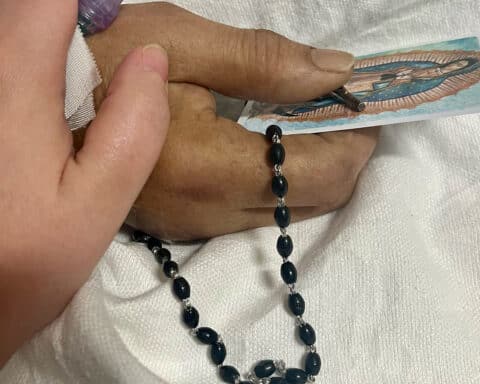I never thought it was strange that Jesus wept when he saw Lazarus dead. Why would he not? You’d have to have a weird notion of some robotic, emotionless Christ to imagine him facing the death of his close friend without feeling grief and anguish.
These tears of Christ are usually explained as evidence that he was truly human, just like us. We see him displaying human emotions many times: Getting angry, being affectionate, getting sarcastic. So this time, the explanation goes, he felt sad, just like us; he felt sorrow and pain, just like anybody.
But I think when he wept at the death of Lazarus, we are seeing something more than that. I think we’re seeing his grief as God.
Exposure to death
What I mean is that humans know that death is bad. No one has to teach us this; it’s an innate understanding that death is an ugly, awful, unnatural thing that we hate and fear and do not want, for ourselves or for anyone.
But it is possible for us to get over this knowledge. It’s possible, over time, with repeated exposure, to become comfortable and blasé toward death. Sometimes it’s just a necessary attitude that people must develop so they can do their jobs, as health care workers, as hospice workers, as soldiers, as morticians. Some people who care for the living are repeatedly exposed to death until it no longer provokes strong emotions.
And some people, without good reason, deaden their consciences so that they no longer feel horror and repulsion at the death of other humans. They expose themselves to such violent imagery and exploitative forms of entertainment, or to such utilitarian social thinking, that they don’t feel even baseline human emotions of grief and repulsion around death anymore. They have successfully amputated that emotional organ, and the tears no longer flow.
God and the reality of death
You might think that God, of all people, has been exposed to death more than anyone. He who has existed from before the dawn of time has been present for every death — every human death, even the ones that no one else in the universe was there to witness, and every other possible kind of death as well — plant death, animal death, bacteria death, planet death. God has seen it all. Talk about overexposed.
And so he weeps for Lazarus. Not “and yet he weeps,” but “and so.”
He weeps not despite his unthinkably massive eternal exposure to deaths of all kinds, but because of it — because of who he is, he alone, unlike humans, sees it for what it is: something that should not be.
Death makes God weep
You can get used to living in the desert, unless you are water. God is water. You can get used to living in the dark, unless you are light. God is light. You can get used to living with death, unless you are life. God is life. Not just the bringer of life, but life itself. No wonder death makes him weep.
The fact that we can get past death, the fact that we can learn to stop weeping over it, shows that we don’t know what it really is. We don’t like it, but we can learn to stop looking it in the face. God does not.
What he does, though, is he walks toward it. Despite the stench. Because of the stench. Because he knows the stench should not be.
Weep, for death is wrong
This Sunday, we heard the Gospel reading of how Jesus wept, and then — almost angrily, it suddenly sounded to me this time — he calls, “Lazarus, come out!” Get out of there. You don’t belong in there! This is not right! I do not like this. This is not how it is meant to be. Death is wrong.
I thought of his face, ignoring Martha’s warning of how bad it would be in there, resolutely facing death and heading toward it to undo it, as I walked toward the altar to receive Communion. “Lord, I am not worthy,” I thought. “Lord, be careful. There will be a stench.”
But the same as he does every Sunday — the same as he has done a hundred billion times since the beginning of human death — he looked death in the face, wept, and said, “Come out.” So I did, and I let him uncover my face and untie me, and I was alive again, because Jesus came to me, because he hates death. He hates death so much that when he sees it, he weeps, and he goes toward it to undo it. All we have to do is let him.
Simcha Fisher is an award-winning columnist who regularly contributes to America Magazine, Parable Magazine and The Catholic Weekly. She lives with her husband and eight of their 10 children and several animals in a surprisingly small house in New Hampshire.





